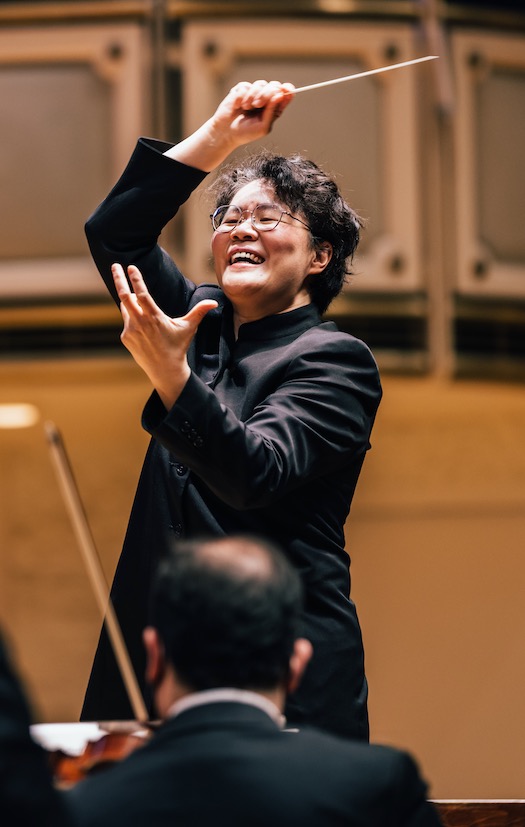Chicago Sinfonietta marks the month by celebrating women (and Rimsky)

The Chicago Sinfonietta’s third concert program of the season, titled “Unapologetic,” celebrated women, aligning with March’s Women’s History Month. On Monday night at Symphony Center, music director Mei-Ann Chen led the orchestra in worthy deliveries of three pieces, and also ran the concert as a sort of party host, attentive to whether everyone, audience and musicians alike, was having a good time.
The concert opened with Tania León’s Stride, the winner of the 2021 Pulitzer Prize for music. One of 19 commissions by the New York Philharmonic to mark the 100th anniversary of the passage of the 19th amendment granting women the right to vote, the Cuban composer’s work saunters through several memorable textures, starting with a glassy string opening cut into by overlapping brass statements with jazzy turns.
The orchestra acquitted itself well in this challenging music. Chen often forwent her usual jocose podium style for textbook beat patterns with precise ictus and numerical hand signals for clear cuing. Some loose ensemble and occasional unframed moments—violas not popping out of the texture for a melodic line—showed a few spots where some finer sandpaper could still have been useful.
Chen had introduced the piece before performing it, warning “It’s not the easiest to listen to” (even though the concert was titled “Unapologetic”). She later stated “Thank you for not leaving the hall.” She surely knows her audience and their expectations, but the remarks felt like they pandered to a closed-minded prejudice against new music.
The program continued with Rachel Barton Pine’s performance of Florence Price’s Violin Concerto No. 2. Pine recently reissued her prescient 1997 album of violin concertos by black composers with an added track for this single-movement piece, the score of which was rediscovered in Price’s former vacation home in St. Anne, Illinois.
The concerto shows Price’s clarity and facility sliding in and out of diatonic areas, using Romantic harmonies with a light hand, a pleasant garden walk of a piece. Some of the swells sound like classic movie music from the age of the studio orchestra. The composer gently connects one area of the piece to the next, often by having Pine or the orchestral melody hover on the fifth scale degree, balanced between finished and unfinished. Chen’s take on the concerto was frictionless to a fault when the finale didn’t build as big as one might hope.
Pine, in a long, reflective dress with a mermaid flair, tossed off the solo part with aplomb, conversing well with the harp and a trumpet, and betraying little effort on the more virtuosic passages, partly because of her economical style and partly because Price’s concerto demands less of the violinist than do most violin showpieces. Indeed, there’s no bravura cadenza opportunity, even if there is some sturm and drang and some rapid-fire violin writing sandwiched between the sunnier beginning and ending.
After the applause, Pine took the microphone and expressed her opinion that the Price concerto deserves a place alongside Barber, Korngold, and Bernstein’s Serenade as the great American violin concertos. While Price’s piece doesn’t have the pyrotechnic flair or the longer-term development of those pieces, it soars and sings just as movingly.
For an encore, Pine played four 18th-century Scottish fiddle tunes, run together with attacca entrances into a single suite. Her deftness in stylizing each one—the second featured a drone and Pine’s biting bow to conjure bagpipes—showed off some impressive technique.
Post-intermission, Chen led the Sinfonietta in Nikolai Rimsky-Korsakov’s Scheherazade. While obviously not composed by a woman, the piece justified its place on the “Unapologetic” program by being about a woman, the storyteller from the “Thousand and One Nights” who staves off her own execution by beguiling the king with narrative cliffhangers. It may be a dubious take for Women’s History Month to spotlight a fictional character’s mere survival in a brutal, sexist system but there are few ultra-familiar crowd-pleasers focused on the 19th amendment.
Contrasts were sharper and Chen was more effusive on the podium, with the orchestra in its comfort zone. The brass section was in fine fettle, giving a big, well-tuned sound in tuttis and pulling off its melodies and dialogues more than capably. When leading the sort of cavalry-charge crescendo near the end of the piece, the brass generated real excitement.
Concertmaster Paul Zafer spun out the famous violin motto nicely, although without the transporting rubato in the triplets that can carry the listener to ancient Arabia. Many of the triplets, across the orchestra, lacked the sense of flowing downhill that characterizes most interpretations, staying somewhat horizontal, weighed down by the stress on the first of the three notes.
The audience listened, rapt, and applauded enthusiastically for a spectacular second-movement finale, and again at the close of the piece and the concert. Chen made certain to recognize every section of the orchestra individually in the applause, often miming playing their instruments to indicate which section should stand, singling out retiring oboe and English horn player June Matayoshi in her final concert.
The Chicago Sinfonietta’s final program of the 2022-23 season, “Boundless,” features music by Molly Joyce and Anna Clyne, and Beethoven’s Symphony No. 7. It is scheduled to be performed May 6 at Wentz Concert Hall in Naperville and May 8 at Symphony Center. chicagosinfonietta.org
Posted in Performances




